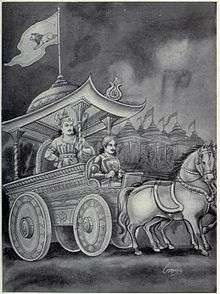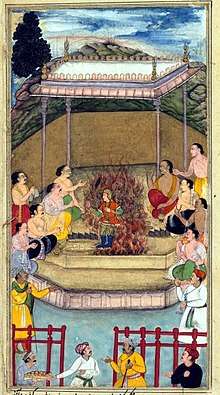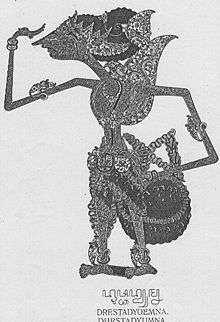Dhrishtadyumna
Dhrishtadyumna (Sanskrit: धृष्टद्द्युम्न, dhṛṣṭadyumna, lit. he who is courageous and splendorous), also known as Draupada (Sanskrit: द्रौपद, lit. son of Drupada), was the son of Drupada and brother of Draupadi and Shikhandi in the epic Mahabharata. He was the commander-in-chief of the Pandava army during the entire Kurukshetra War i.e. for 18 days. Dhrishtadyumna killed Drona, the royal guru, when he was meditating which was against the rules of engagement.[1]
| Dhrishtadyumna | |
|---|---|
| Mahabharata character | |
 Dhrishtadyumna, the commander in chief of Pandava Army | |
| In-universe information | |
| Family | Draupadi (sister); Drupada(father) Kokila Devi (mother) Shikhandi (sister later brother) Satyajit (brother) |
| Children | Kshatradharman, Kshatravarman, Kshatranjaya and Dhrishtaketu (sons) |
| Relatives | Pandavas (Brothers in law) |
| Home | Panchala |
Birth

After Pandavas and Kauravas completed their training under Drona, they were asked by Drona to attack and defeat Drupada as a Gurudhakshina. Arjuna was able to defeat Drupada. After Drupada's defeat, Panchala was divided into two parts. This enraged Drupada and he wanted to take revenge. Drupada had many warrior children, but none of them could not defeat Drona. So, he performed a yagna to obtain a son capable of killing Drona. From the holy flames of the yagna, emerged a full grown man. Drupada named him Dhrishtadyumna. After Dhrishtadyumna , a beautiful woman emerged. She was Draupadi.[2]
After some time, Drona visited Panchala. There he met Dhrishtadyumna. Even though Dhrishtadyumna was the prophesied killer of Drona, he was accepted as a student by Drona, and he learned advanced military arts.[3]
Draupadi's Swayamvar

Dhrishtadyumna hosted his sister's swayamvar and told its rules to the kings and princes.
When a young Brahmin won Draupadi in front of all the princes and nobility, Dhrishtadyumna secretly followed the Brahmin and his sister, only to discover that the Brahmin was in fact Arjuna, one of the five Pandava brothers.[1]
Marriage and children
Dhrishtadyumna is said to have multiple wives, and begot his children from them.[4] He had 4 sons - Kshtradharman[5], Kshatravarman[6], Kshatranjaya[7] and Dhrishtaketu[8]. The first 3 were killed in the Kurukshetra War by Dronacharya, whereas Dhrishtaketu was killed by Karna.[9]
Kurukshetra War
Dhristadyumna was appointed as the Senapati (command in chief) of the Pandava Army. He maintained his position till the end of the war. On the 15th day of the war, Drona killed Drupada. The Pandavas knew that killing Drona wasn't an easy task and decided to use a trick. Drona had only one weakness, his son Ashwatthama. Bhima killed an elephant named Ashwatthama. The Pandavas spread the news of Ashwatthama's death. When, Drona heard the news, he could not believe that his son died. When Yudhishthira too shouted "Ashwatthama hatah kujaraha" (Ashwatthama, the elephant is killed), Nakula blew his conch exactly at the utterance of the word Kunjar (elephant). Drona having missed the utterance of the word "Kunjaraha" from [[Yudhishthira], a symbol of dharma, thought that his son really died and was heartbroken. Krishna then convinced Drona to surrender. Drona sat down, started to meditate and his soul left his body. Seeing this, Dhristadyumna took his sword and chopped Drona's head.[10]
Death
On the 18th night of the war, Ashwathama attacked the Pandava camp during the night, and killed Dhristadyumna. As Dhristadyumna begs for an honorable death, asking to die with a sword in his hand, Ashwathama ignores him, proceeding to beat and smother him to death by beheading him.[11]
Analysis
In one of the many side-stories of the Mahabharatha, there is drama centered around the fact that Dhrishtadyumna, despite not being Drupada's eldest, is his heir. While Drupada and others give many reasons for this, it is implied that the real reason is because Dhristadyumna has a godly parent, and thus more coveted as a ruler since his rule would seem more blessed. Dhristadyumna somewhat internalizes this, looking down upon Satyajit's pacifism and Shikhandi's single-minded hatred of Bhisma. He makes a point out of never bowing to or respecting his siblings, never wanting to legitimize any claim to Panchal they might have.[12]
References
- "Positive thinking: Dhrishtadyumna". DNA. 7 December 2012.
- https://glorioushinduism.com/2016/11/11/dhrishtadyumna/
- http://en.krishnakosh.org/krishna/Dhrishtadyumna
- "The Mahabharata, Book 10: Sauptika Parva: Section 8". www.sacred-texts.com.
- "The Mahabharata, Book 7: Drona Parva: Dronabhisheka Parva: Section XXIII". www.sacred-texts.com.
- "Kshatravarman, Kṣatravarman, Kshatra-varman: 1 definition". www.wisdomlib.org. 9 March 2019.
- "Kshatranjaya, Kṣatrañjaya: 1 definition". www.wisdomlib.org. 13 March 2019.
- "Dhrishtaketu, Dhrishta-ketu, Dhṛṣṭaketu: 9 definitions". www.wisdomlib.org. 29 June 2012.
- "Dhrishtadyumna, Dhrishta-dyumna, Dhṛṣṭadyumna: 9 definitions". www.wisdomlib.org. 29 June 2012.
- https://glorioushinduism.com/2016/11/11/dhrishtadyumna/
- K M Ganguly (1883-1896). The Mahabharatha Book 10: Sauptika Parva section 8 Ashwatthama killing Dhrishtadyumna, October 2003
- Debroy, Bibek (June 2015). The Mahabharata, Volume 4. United Kingdom: Penguin Books.
